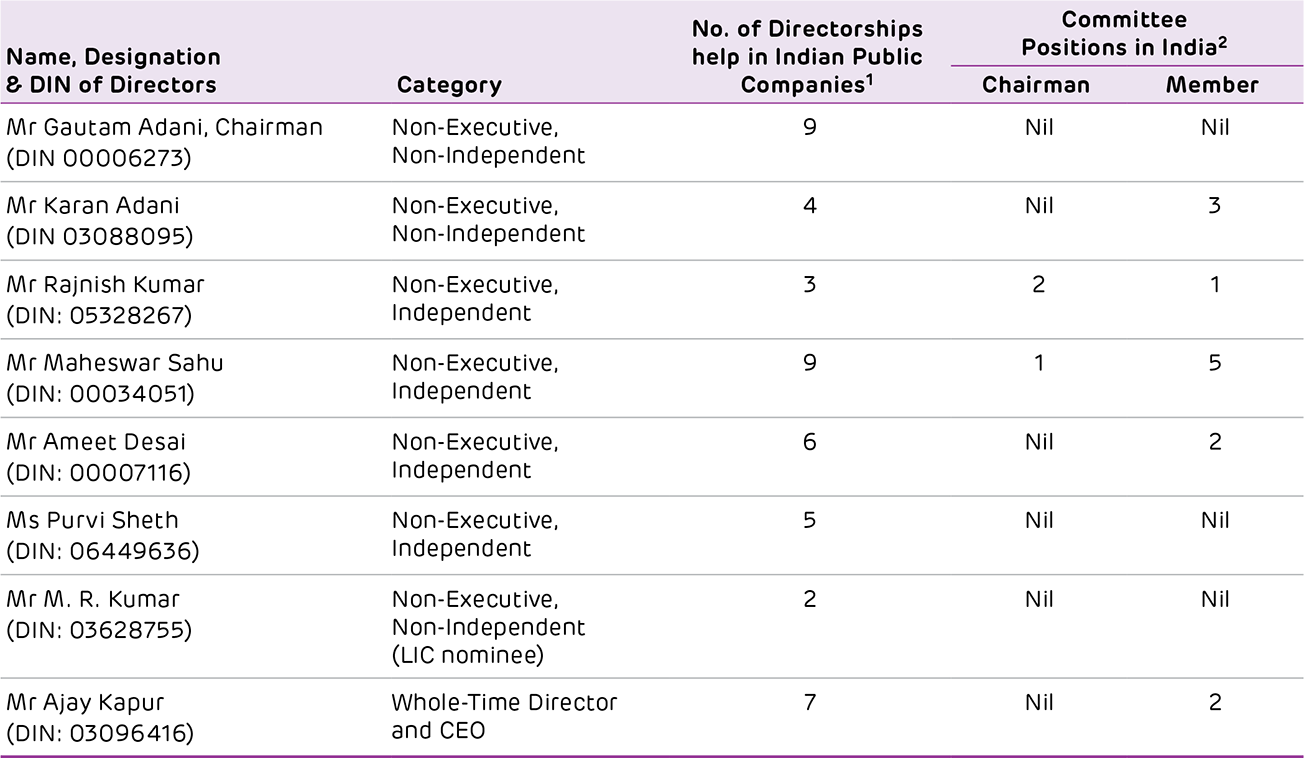Ambuja Cements strives for the highest standards of corporate governance. With commitments to meet the needs and expectations of the stakeholders, the Company conducts its business responsibly, ethically, and in compliance with applicable laws and regulations.

Board Committees
The Company’s Board Committees handle specific activities and resolve diverse matters, ensuring sound corporate governance practices across the organisation. The Board Committees are set up under the formal approval of the Board to carry out clearly defined roles which are performed by members of the Board as a part of good governance practice. The Board oversees its responsibilities by the Committees and ensures good governance practices.

Statutory Committees
- Audit Committee (quarterly meetings; 100% Independent Directors)
- Stakeholder Relationship Committee (quarterly meetings; 50% Independent Directors)
- Corporate Social Responsibility Committee (halfyearly meetings; 75% Independent Directors)
- Nomination and Remuneration Committee (halfyearly meetings; 100% Independent Directors)
- Risk Management Committee (quarterly meetings; 75% Independent Directors)

Governance Committees
- Corporate Responsibility Committee (quarterly meetings; 100% Independent Directors)
- Public Consumer Committee (half-yearly meetings; 100% Independent Directors)
- Reputation Risk Committee (half-yearly meetings; 50% Independent Directors)
- Commodity Price Risk Committee (half-yearly meetings; 50% Independent Directors)
- Legal, Regulatory and Tax Committee (half-yearly meetings; 75% Independent Directors)
- Merger and Acquisition Committee (as and when; 50% Independent Directors)
- Information, Technology and Data Security Committee (half-yearly meetings; 75% Independent Directors)
Board Independence
The Independent Directors have submitted the Declaration of Independence, confirming their ongoing commitment to the independence criteria specified in Section 149 of the Companies Act, 2013, and Regulations 16 of the Listing Regulations. These regulations mandate that companies maintain a minimum of one-third of the total Directors as Independent Directors, a requirement the Company fully meets.
Importantly, there have been no changes affecting their status as Independent Directors within the Company. The Board comprises five Independent Board Members, and detailed profiles of these individuals are available in the Corporate Governance Report, offering comprehensive information about their backgrounds. The Board affirms that the Independent Directors are individuals of esteemed reputation and integrity, possessing the necessary expertise and experience in their respective fields.
Board Industry Experience
An individual's comprehension and familiarity with a specific industry, encompassing technical proficiency, process insights, software utilisation, and other tools, is considered industry experience. It also involves understanding customer requirements, organisational culture, and business development. It is an individual's practical onthe-job experience and a broader awareness of the industry. The Board's industry experience is discussed in detail below:

Board Industry Experience
The Board oversees the Company's performance and formulates strategic decisions by evaluating various operational facets, including but not limited to risk management, sustainability, and stakeholder relationships. Regular Board meetings are held to assess and provide opinions, with a commendable 92.86% attendance during FY 2023-24, reflecting active Board engagement.
Ambuja Cements is the first company in the country to integrate Board-level participation in compliance matters. A dedicated committee, chaired by an Independent Director, is formed for this purpose.
The Company’s senior management consistently briefs the Board on key business matters, and at an annual special meeting, Board members review and approve the next year's business plan. The Audit Committee and the Board scrutinise and sanction each related-party transaction, seeking shareholder approval when necessary. All related-party transactions are entered into on an arm's length basis and comply with the applicable provisions of the Companies Act 2013 and the Listing Agreement. Details of the related-party transaction management processes are in the financial statements part of the Integrated Annual Report 2023-24.
The senior management regularly updates the Directors to keep them abreast of business processes and activities. Frequent interactions with the Adani Group Management ensure that Directors are informed about the Group's best practices and key events.
The Nomination and Remuneration Committee drives the Company's succession planning process. The Board, through various committees, ensures the Company aligns with environmental, social, and governance parameters. Regular updates on project functioning and specific developments are sought across the organisation.

Board Effectiveness
The Company ensures that the Board is aligned with longterm goals and is committed to stakeholders' best interests. By prioritising strategic direction, risk management, financial performance, shareholder engagement, and sustainability, the Board aims to generate enduring value for its shareholders. The Board actively oversees strategy execution, evaluates risks, and ensures transparent communication of financial information. The Board's responsibilities encompass considering the long-term effects, optimising resource utilisation, and fostering an ethical environment, which includes implementing measures to prevent corruption and unethical practices.
Indian Corporate Governance Scorecard
Ambuja Cements is placed in the 'Good' category by Institutional Investor Advisory Services (IiAS) in the Indian Corporate Governance Scorecard (2023)*
* The Indian Corporate Governance Scorecard framework is jointly developed by the International Finance Corporation (IFC), Bombay Stock Exchange (BSE), and Institutional Investor Advisory Services India Limited (IiAS). It provides a standardised and objective evaluation of corporate governance practices of enterprises. The scorecard has been developed considering G20 and OECD Principles of Corporate Governance, which are globally accepted benchmark for corporate governance.
Board Evaluation
The Board implemented a formal procedure to assess its performance, along with its Committees and Individual Directors, including the Chairman. This evaluation involved a structured process covering various aspects of the Board's functioning, such as composition, Committee effectiveness, experience, competencies, fulfilment of specific duties and obligations, contribution to meetings, and overall governance issues.
After the Independent Directors' meeting, the Board convened to discuss the performance of the Board, its committees, and individual Directors. The evaluation of Independent Directors was conducted by the entire Board, excluding the Independent Director under evaluation.
Board Remuneration
The Remuneration policy of Directors guides the Board’s compensation following the existing laws and regulations. The policy ensures the optimum level and composition of remuneration of the Directors.
For more details, read the Corporate Governance Report available in page.
